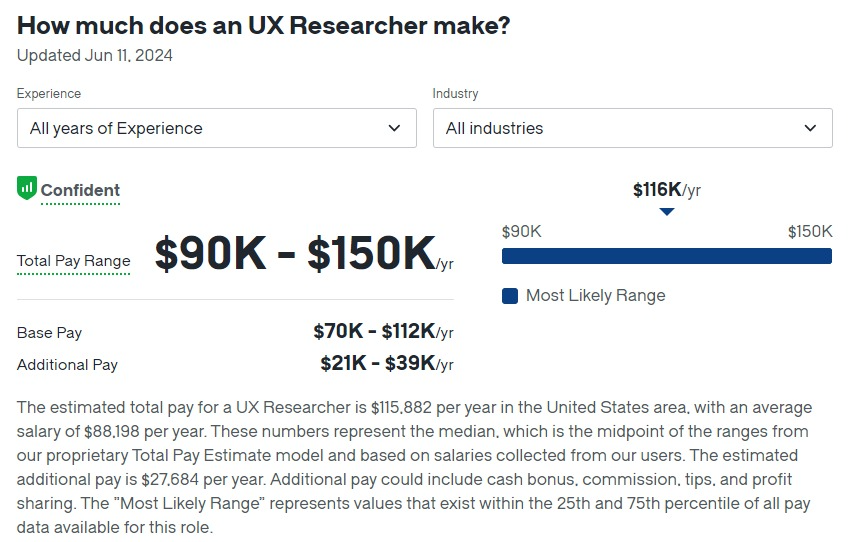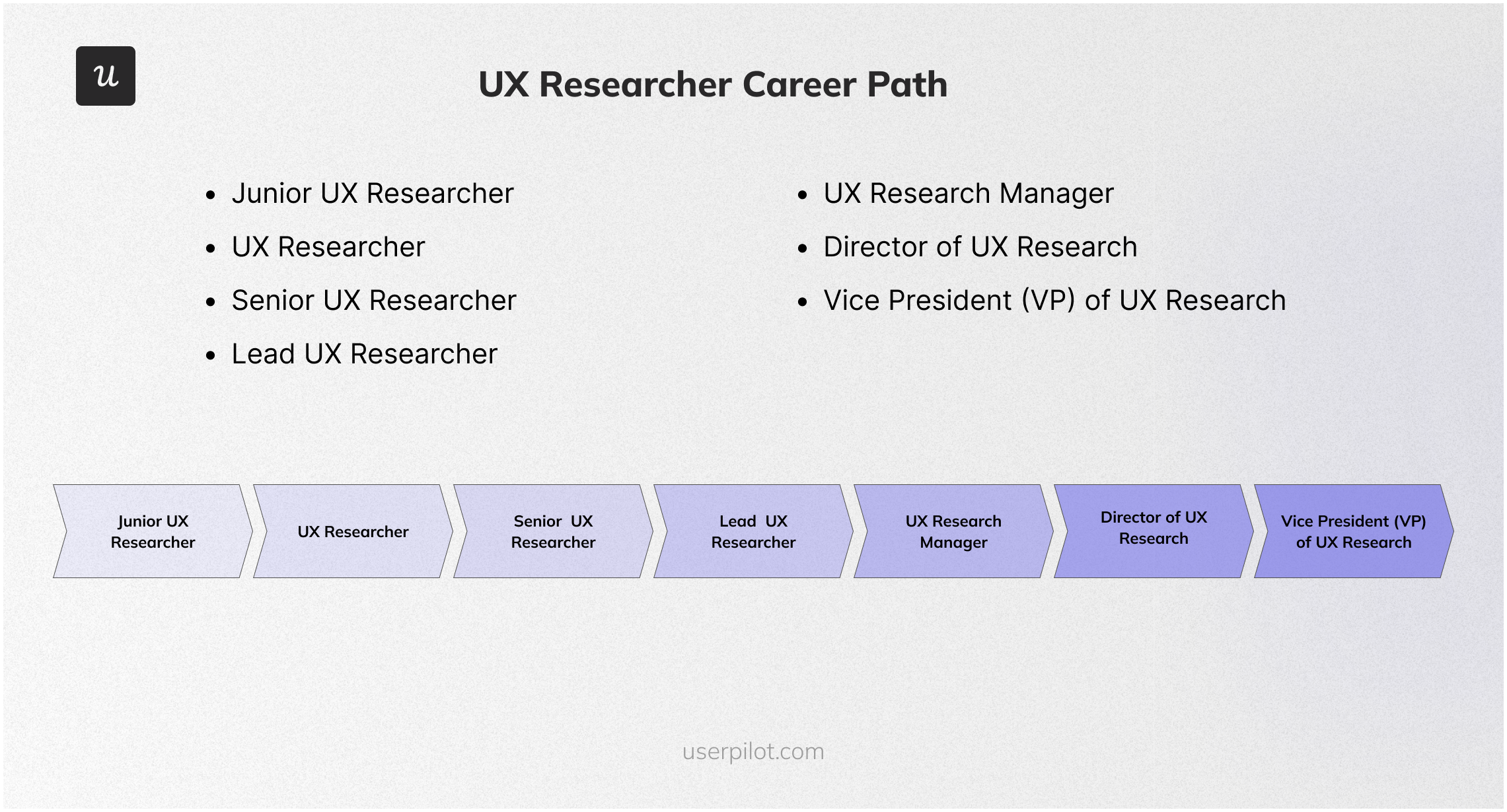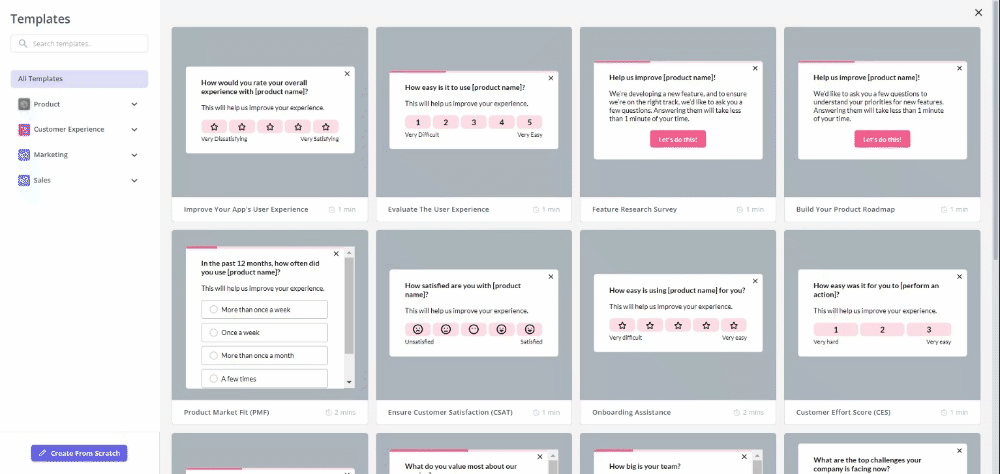
Get The Insights!
The fastest way to learn about Product Growth, Management & Trends.
What is a UX researcher?
A UX researcher in SaaS specializes in understanding user behaviors, needs, and motivations through various research methods to inform product design and development.
They conduct user interviews, surveys, usability tests, and analyze data to provide actionable insights. These insights help improve user experience and ensure the product meets user expectations and business goals.
In the SaaS industry, UX researchers play a critical role in optimizing software interfaces and features to enhance user satisfaction and engagement.
What does a UX researcher do?
A UX researcher is responsible for understanding users’ needs and behaviors to guide product design decisions. They use various research methods like user interviews, surveys, and usability tests to collect data on how users interact with products.
In the SaaS industry, UX researchers analyze this data to improve software usability and functionality, ensuring the product is intuitive and meets user expectations. Their insights help create user-friendly products that enhance user satisfaction and drive business success.
UX researcher’s main responsibilities
A UX researcher plays a crucial role in understanding user behaviors and needs to inform the design and development of SaaS products.
Here are the main responsibilities and duties of a UX Researcher:
- Conduct User Research: Plan and execute qualitative and quantitative research studies, such as user interviews, surveys, and usability testing.
- Analyze Data: Interpret and synthesize research findings to generate actionable insights and recommendations for product improvements.
- Collaborate with Teams: Work closely with product managers, designers, and developers to integrate research findings into the product development process.
- Create Research Reports: Prepare detailed reports, personas, journey maps, and presentations to effectively communicate insights to stakeholders.
- Advocate for Users: Promote a user-centered design approach within the organization, ensuring user needs and feedback are prioritized.
- Stay Updated: Keep abreast of the latest UX research methods, tools, and industry trends to continuously improve research practices.
- Conduct Competitive Analysis: Analyze competitors’ products to understand market trends and identify opportunities for innovation.
- Facilitate Workshops: Lead workshops and brainstorming sessions to gather input from stakeholders and users.
- Develop Research Plans: Create and manage research plans, timelines, and budgets to ensure projects are completed on schedule.
These responsibilities ensure that UX researchers effectively contribute to the creation of user-centric SaaS products that meet both user and business needs.
UX researcher salary
A career as a UX researcher can be financially rewarding, with salaries varying based on experience, location, industry, and the company. Here’s a detailed breakdown:
Salary by experience
- Entry-Level (0-2 years): Approximately $60,000 per year, with a range from $43,000 to $87,000.
- Mid-Career (2-5 years): Around $90,000 per year, ranging from $57,000 to $108,000.
- Experienced (5-10 years): About $96,000 per year, with a range from $70,000 to $132,000.
- Late Career (10+ years): Average salary is approximately $106,000 per year.
Salary by location
- San Francisco, CA: $149,315 per year.
- New York, NY: $127,877 per year.
- Austin, TX: $128,333 per year.
- Chicago, IL: $115,598 per year.
Salary by industry
- Technology: Generally, UX researchers in the tech industry can expect salaries ranging from $92,000 to $146,000 per year.
- Finance: Salaries in the financial sector can range from $86,000 to $134,000 annually.
- Healthcare: UX researchers in healthcare might earn between $75,000 and $120,000 per year.
- Retail: The retail sector offers salaries ranging from $70,000 to $110,000 annually.
Highest paying companies
- Google: $120,000 to $230,000 per year.
- LinkedIn: $115,000 to $220,000 per year.
- Meta (Facebook): $110,000 to $210,000 per year.
- Apple: $105,000 to $200,000 per year.
These figures highlight the lucrative nature of a career in UX research, especially within top tech companies and in major metropolitan areas.
UX researcher career path
A career in UX research involves progressing through various roles, each with increasing responsibility and expertise.
Here’s a typical career progression for a UX Researcher:
- Junior UX Researcher: Assists in conducting user research, supports senior researchers, and helps with data collection and analysis. To progress, focus on learning various research methods, gaining practical experience, and building a strong portfolio. Seek feedback from mentors and participate in internships to develop skills.
- UX Researcher: Conducts user research studies, analyzes data, and provides insights to inform product design decisions. Collaborates with designers, developers, and product managers. To advance, take on more complex projects, deepen your understanding of user research methodologies, and develop strong communication skills to present findings effectively.
- Senior UX Researcher: Leads major research projects, mentors junior researchers, and plays a key role in strategic planning and decision-making. Provides detailed insights that significantly impact product development. Enhance leadership skills, contribute to creating research frameworks and methodologies, and build strong relationships with cross-functional teams.
- Lead UX Researcher: Oversees the research team, ensures the quality and consistency of research activities, and aligns research goals with business objectives. Manages multiple projects and collaborates with senior stakeholders. Develop project management skills, drive innovation within the team, and engage in high-level strategic planning. Focus on fostering a user-centered culture within the organization.
- UX Research Manager: Manages the UX research team, coordinates research efforts across projects, and ensures alignment with overall business strategy. Provides leadership and mentorship to the research team. Enhance managerial skills, stay updated with industry trends, and focus on optimizing team performance and research processes. Advocate for the importance of UX research in strategic decisions.
- Director of UX Research: Sets the overall research strategy for the organization, collaborates with top executives, and ensures the integration of research insights into the company’s vision and goals. Oversees all research activities and initiatives. Focus on strategic leadership, expand influence across departments, and drive innovation in research practices. Develop a vision for the future of UX research within the organization.
- Vice President (VP) of UX Research: Responsible for the entire research function within the organization, driving research excellence and contributing to the overall business strategy. Manages a large team of researchers and oversees all research-related activities. Strengthen executive leadership skills, maintain a forward-thinking research vision, and foster a culture of innovation and creativity within the research team.
Each step in this career path builds on the previous one, emphasizing continuous learning, leadership, and strategic thinking to progress to higher levels of responsibility and influence in the field of UX research.
Best practices for being a great UX researcher
To excel as a UX researcher, it’s essential to adopt practices that enhance your ability to gather meaningful insights and communicate them effectively.
Here are some best practices:
- Empathize with Users: Always strive to understand and share the feelings of users. This helps in designing experiences that truly meet their needs and solve their problems. Conduct thorough user interviews and immerse yourself in the user’s environment whenever possible.
- Communicate Clearly: Present your findings in a way that is easily understandable to stakeholders from different backgrounds. Use visual aids like charts, graphs, and personas to make your data more accessible and engaging.
- Collaborate with Cross-Functional Teams: Work closely with designers, developers, product managers, and other stakeholders. Effective collaboration ensures that research insights are integrated into the product development process and that everyone is aligned with user needs.
- Stay Updated with Industry Trends: UX research is a rapidly evolving field. Stay current with the latest research methods, tools, and industry trends by attending conferences, participating in webinars, and reading relevant literature.
- Iterate Based on Feedback: UX research is an iterative process. Use feedback from users and stakeholders to continuously refine your research methods and insights. This helps you make informed design decisions and improve the user experience.
- Maintain Objectivity: Ensure that your research is unbiased and objective. Avoid leading questions and let the data speak for itself. This helps in building trust with stakeholders and ensuring that design decisions are based on solid evidence.
- Document Your Findings: Keep detailed records of your research processes, findings, and insights. This documentation can be invaluable for future projects and for providing context to new team members.
By following these best practices, you can enhance your effectiveness as a UX researcher and contribute to creating user-centric products that meet both user and business needs.
UX researcher FAQs
- Who can become a UX researcher? Anyone with a background in psychology, human-computer interaction, design, or related fields and a strong interest in understanding user behaviors and improving user experiences can become a UX researcher.
- Do UX researchers get paid well? Yes, UX researchers generally receive competitive salaries, with compensation varying based on experience, location, and industry, often ranging from $60,000 to over $120,000 per year.
- Is it hard to be a UX researcher? Being a UX researcher can be challenging due to the need for strong analytical skills, the ability to conduct and interpret various research methods, and effective communication of findings to stakeholders.
- Do UX researchers need to code? No, UX researchers do not typically need to code, but having a basic understanding of coding can be beneficial for communicating with development teams and understanding technical constraints.
- Do you need a PhD to be a UX researcher? No, a PhD is not required to be a UX researcher. Most positions require a bachelor’s or master’s degree in a relevant field, though higher education can enhance career prospects and earning potential.
Conclusion
We hope this guide has provided you with valuable insights into the roles, responsibilities, and rewards associated with this role.
Looking into tools for UX researchers? Userpilot is an all-in-one product platform with engagement features and powerful analytics capabilities. Book a demo to see it in action!








